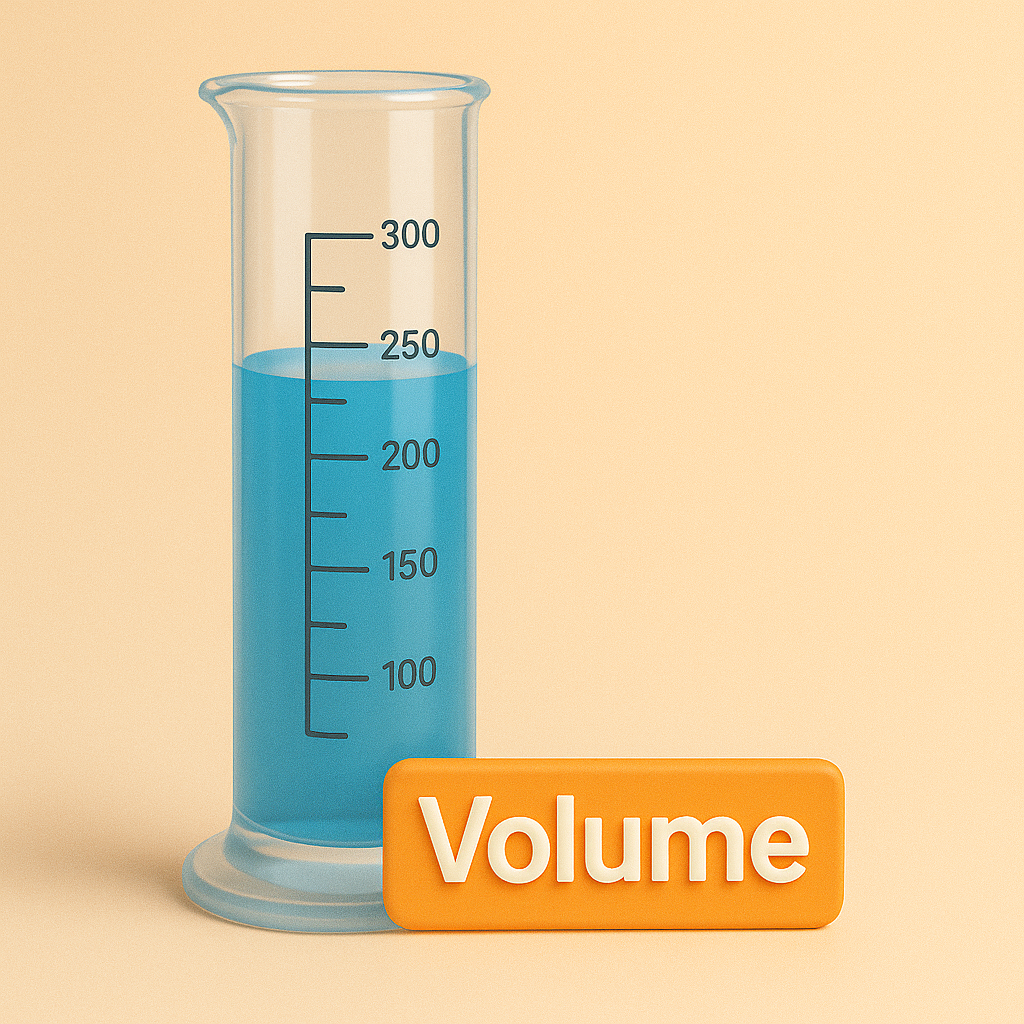Volume
Definition
Volume refers to the amount of space that a substance or object occupies or contains. It can also refer to the loudness of sound, or a book forming part of a series.
Parts of Speech
- Noun
Pronunciation
American English
- IPA Pronunciation: /ˈvɑːl.juːm/, /ˈvɑːl.jəm/
- Respelling: VOL-yoom, VOL-yuhm
British English
- IPA Pronunciation: /ˈvɒl.juːm/, /ˈvɒl.jəm/
- Respelling: VOL-yoom, VOL-yuhm
Etymology
The word "volume" originates from Latin "volumen," meaning "roll" or "scroll," derived from "volvere," meaning "to roll." It entered Middle English in the late 14th century through Old French "volume."
Derivatives
- Voluminous (adjective)
- Volumetric (adjective)
- Volumize (verb)
- Volume-controlled (adjective)
- Volumization (noun)
Synonyms
- Capacity
- Loudness
- Book
Antonyms
- None
Usage
The noun "volume" is widely used in scientific, literary, and everyday contexts. For example, it refers to the size of a container ("The volume of the box is 50 liters"), the intensity of sound ("Turn down the volume"), or a book in a series ("The second volume of the encyclopedia is missing").
Related Terms
- Mass: A measure of the amount of matter in an object.
- Density: The mass per unit volume of a substance.
- Amplitude: The strength or intensity of sound waves.
Detailed Definitions
Noun
- The amount of space occupied by a substance or object: Refers to the three-dimensional extent of an object or material.
- Example: "The liquid's volume was measured in milliliters."
- The loudness of sound: Refers to the perceived intensity of an audio signal.
- Example: "Please lower the volume of the music."
- A book forming part of a series or set: Refers to a physical or digital book that is part of a collection.
- Example: "The library has all the volumes of the encyclopedia."
- An amount or quantity of something: Refers to the extent or magnitude of a substance or activity.
- Example: "The factory produces a high volume of goods daily."
volume



🇨🇳 Mandarin (Simplified Chinese)
- 体积
- IPA: /tʰi˧˥ t͡ɕi˥˩/
- English Respell: Tǐjī
- 音量
- IPA: /in˥˩ luɑn˧˥/
- English Respell: Yīnliàng
🇮🇳 Hindi
- आयतन
- IPA: /ɑːjət̪ən/
- English Respell: Aayatan
- मात्रा
- IPA: /maːt̪raː/
- English Respell: Maatra
🇪🇸 Spanish
- Volumen
- IPA: /bo.luˈmen/
- English Respell: Volumen
- Tomo
- IPA: /ˈtomo/
- English Respell: Tomo
🇫🇷 French
- Volume
- IPA: /vɔ.lym/
- English Respell: Volume
- Tome
- IPA: /tom/
- English Respell: Tome
🇸🇦 Modern Standard Arabic
- حجم
- IPA: /ħæd͡ʒm/
- English Respell: Hajm
- صوت
- IPA: /sˤuːtˤ/
- English Respell: Saut
🇧🇩 Bengali
- আয়তন
- IPA: /aɪ̯o.t̪on/
- English Respell: Aẏatan
- ভলিউম
- IPA: /bʱɔli.um/
- English Respell: Bholium
🇷🇺 Russian
- Объем
- IPA: /ˈobʲɪm/
- English Respell: Ob'yem
- Том
- IPA: /tom/
- English Respell: Tom
🇵🇹 Portuguese
- Volume
- IPA: /voˈlumi/
- English Respell: Volume
- Tomo
- IPA: /ˈtomu/
- English Respell: Tomo
🇮🇩 Indonesian
- Volume
- IPA: /ˈvɔlume/
- English Respell: Volume
- Jilid
- IPA: /d͡ʒilid/
- English Respell: Jilid
🇩🇪 German
- Volumen
- IPA: /voˈluːmən/
- English Respell: Volumen
- Band
- IPA: /bant/
- English Respell: Band
🇯🇵 Japanese
- 体積
- IPA: /taɪːsekɪ/
- English Respell: Taiseki
- 音量
- IPA: /on.rjoː/
- English Respell: Onryō
🇻🇳 Vietnamese
- Thể tích
- IPA: /tʰe˨˩tɪk˧/
- English Respell: Thể tích
- Âm lượng
- IPA: /ʔam˧˥ lʊwŋ͡m˧˥/
- English Respell: Âm lượng
🇰🇷 Korean
- 부피
- IPA: /pu.pʰi/
- English Respell: Bupi
- 음량
- IPA: /ɯm.ɾjaŋ/
- English Respell: Eumryang
🇹🇷 Turkish
- Hacim
- IPA: /hɑːˈd͡ʒim/
- English Respell: Hacim
- Ses seviyesi
- IPA: /seːs seviˈjesi/
- English Respell: Ses seviyesi
🇵🇰 Urdu
- حجم
- IPA: /ħæd͡ʒm/
- English Respell: Hajm
- صوت
- IPA: /sˤuːtˤ/
- English Respell: Saut





